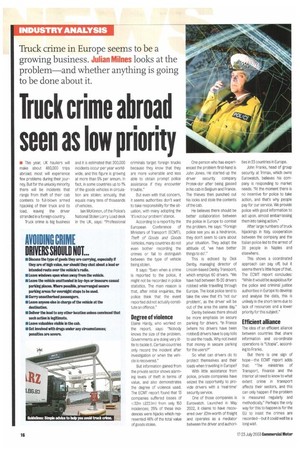Truck crime abroad seen as low priority
Page 16

If you've noticed an error in this article please click here to report it so we can fix it.
Truck crime in Europe seems to be a growing business. Julian Milnes looks at the problem—and whether anything is going to be done about it.
II This year, UK hauliers will make about 480,000 trips abroad: most will experience few problems during their journey. But for the unlucky minority there will be incidents that range from theft of their cab contents to full-blown armed hijacking of their truck and its load, leaving the driver stranded in a foreign country.
Truck crime is big business and it is estimated that 200,000 incidents occur per year worldwide, and this figure is growing at more than 5% per annum. In fact, in some countries up to 1% of the goods vehicles in circulation are stolen: annually, that equals many tens of thousands of vehicles.
lain McKinnon, of the Police's National Stolen Lorry Load desk in the UK, says: "Professional criminals target foreign trucks because they know that they are more vulnerable and less able to obtain prompt police assistance if they encounter trouble."
But even with that concern, it seems authorities don't want to take responsibility for the situation, with many adopting the 'it's not our problem' stance.
According to a report by the European Conference of Ministers of Transport (ECMT), Theft of Goods and Goods Vehicles, many countries do not even bother recording the crimes or fail to distinguish between the type of vehicle being stolen.
It says: "Even when a crime is reported to the police, it might not be recorded in police statistics. The main reason is that, after initial enquiries, the police think that the event reported did not actually constitute an offence."
Degree of violence
Elaine Hardy, who worked on the report, says: "Nobody knows the size of the problem. Governments are doing very little to tackle it. Certain countries only record the incident after investigation or when the vehicle is recovered."
But information gained from the private sector shows alarming levels of theft in terms of value, and also demonstrates the degree of violence used. The ECMT report found that 13 companies suffered losses of ‘:32m (.£22.1m) from only 150 incidences; 25% of these incidences were hijacks which represented 46% of the total value of goods stolen.
One person who has experienced the problem first-hand is John Jones. He started up the driver security company Protek-dor after being gassed in his cab in Belgium and France. The thieves then punched out his locks and stole the contents of the cab.
He believes there should be better collaboration between the police in Europe to combat the problem. He says: "Foreign police see you as a hindrance, they don't seem to care about your situation. They adopt the attitude of, 'we have better things to do'."
This is echoed by Dick Denby, managing director of Lincoln-based Denby Transport, which employs 60 drivers. "We have had between 15-20 drivers robbed while travelling through Europe. The local police tend to take the view that it's 'not our problem', as the driver will be out of the area the same day."
Denby believes there should be more emphasis on secure parking for drivers. "In France [where his drivers have been robbed] drivers have to pay tolls to use the roads. Why not invest that money in secure parking for the users?"
So what can drivers do to protect themselves and their loads when travelling in Europe?
With lithe assistance from police, private companies have seized the opportunity to provide drivers with a 'real-time' security service.
One of those companies is Eurowatch. Launched in May 2002, it claims to have recovered over 12m-worth of freight and operates as a mediator between the driver and authori
ties in 23 countries in Europe.
John Franks, head of group security at Trimax, which owns Eurowatch, believes his company Is responding to market needs. "At the moment there is no incentive for police to take action, and that's why people pay for our service. We provide police with good information to act upon, almost embarrassing them into taking action," After large numbers of truck hijackings in Italy cooperation between the company and the Italian police led to the arrest of 38 people in Naples and elsewhere.
This shows a coordinated approach can pay off, but it seems there's little hope of that. The ECMT report concludes: "While it would be auspicious for the police and criminal justice authorities in Europe to develop and analyse the data, this is unlikely in the short-term due to lack of resources and a lower priority for this subject."
Efficient alliance
The idea of an efficient alliance between countries that share information and co-ordinate operations is "Utopia", according to Franks.
But there is one sign of hope—the ECMT report adds that: "The ministries of Transport, Finance and the Interior all need to know to what extent crime in transport affects their sectors, and this can only happen I the problem is measured regularly and methodically" Perhaps the only way for this to happen is for the EU to insist the crimes are recorded—but it could well be a long wait.
















































































































































































